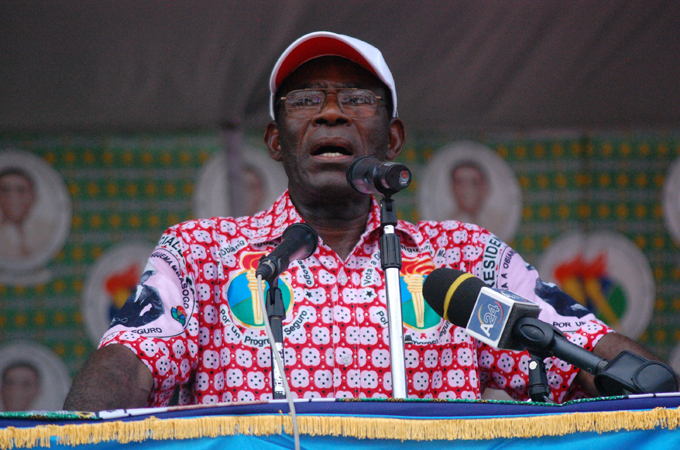Equatorial Guinea holds constitutional polls
Vote to pave way for constitution that seeks to limit presidential terms in nation with Africa’s longest-serving leader.

 |
| President Teodoro Obiang Nguema seized power in a coup and remains Africa’s longest-serving leader [Al Jazeera] |
Equatorial Guineans have voted in a referendum that would limit presidential terms in the small oil-rich African country, which has been ruled by the same man for 32 years.
The opposition, however, has called the plebiscite a charade and withdrew its representatives from polling places after alleging serious election violations.
Voting closed at 6:00pm local time (17:00 GMT) on Sunday, and the country’s information minister said shortly afterwards that the package of reforms had passed with more than 99 per cent of the vote, with 60 per cent of ballots counted.
Final results are not due until Wednesday, but Jeronimo Osa Osa Ecoro, the information minister, said victory was assured for the reforms package.
“On the national territory, 99.04 percent voted yes and 0.96 percent no,” he said. The outcome, he added: “is a good thing for Equatorial Guinea. It is a project for the political, economic, social and cultural future. “The people are delighted.”
About 300,000 people were eligible to vote and more than half of the 1,500 polling stations were in the capital Malabo, though no official figures on the number of peopled who voted were available.
The referendum is designed to strengthen the small state’s democracy, but the opposition said the text did not make clear whether Teodoro Obiang Nguema, the president, would step down when his term ends in 2016.
‘No one is voting’
Opposition leader Placido Mico, who is the only opposition lawmaker in the 100-member parliament, said there was no consultation ahead of the vote.
“No one has seen the text, not the cabinet or any official body,” he said. “It was not studied in parliament. We are submitting a text to a referendum that no one has seen. It’s an invisible text.”
On Sunday, he dismissed the referendum as a sham, withdrawing all representatives from his Convergence for Social Democracy party from polling places at 1:30pm local time (12:30 GMT) after witnessing and hearing accounts of election violations.
A young supporter of his party “was threatened with being tortured by a colonel” at a polling station in Malabo, he said. Voters were facing pressure across the country, he added.
“There is no participation. It’s not going beyond 25 percent. I have visited some 50 polling stations since 11:00 am. No one is voting” said Mico.
Ecoro, the country’s information minister, however, said that voting had taken place in a “climate of calm, peace and tranquility”. Before polls closed, he said that voting in his Anisok constituency was “for the moment 99 per cent in favour of reform”.
He called the referendum a “democratic milestone”, adding: “President Obiang is carrying out reforms to bring sounder economic policies and more democracy to the country’s governance.”
Obiang, 69, is currently serving his fourth seven-year term, which he won in the November 2009 elections. He seized power in 1979, winning his first presidential vote in 1989.
During the coup he had his uncle, the former Spanish colony’s first president, executed by firing squad.
Obiang, who currently chairs the African Union, is on an offensive to win himself a clean bill of health on the international scene and reverse his country’s reputation as one of Africa’s most corrupt and autocratic.
“He wants his country, long ignored or despised, to acquire a diplomatic status that matches its new financial weight,” said one diplomat, speaking on condition of anonymity.
Mired in poverty
Equatorial Guinea, with a population of around 700,000, struck oil off its Atlantic coast in the early 1990s and has become sub-Saharan Africa’s third biggest producer, but the majority of its people live in abject poverty.
Obiang has come in for criticism by the opposition for the lavish style of his 41-year-old son Teodoro Obiang Mangue, who owns a $31m home in Malibu, California.
The opposition charge that Mangue – who is nicknamed Teodorin and has a penchant for sports cars and champagne – is being groomed for the new vice-presidency and could eventually succeed his father.
Mico, opposition lawmaker, said: “Most sources suggest that Teodorin is tipped to succeed” Obiang.
He dismissed the proposed reforms as “lies” intended to “further secure Obiang and his family’s dictatorship and pave the way for a hereditary succession”.
Mico also noted a provision of the proposed text according to which the newly created state council can only be headed by a former president.
“How many former presidents do we have in this country?” Mico asked.
The government says the new constitution would also create a position of vice president, impose more checks and balances on the executive, improve the judicial system and ensure better protection of civic rights.